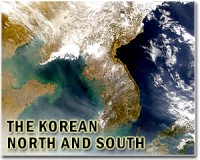 |
Yeonpyeong Island, South Korea (AFP) Nov 25, 2010 Grim-faced soldiers trudged through broken glass and blackened debris Thursday on a remote South Korean fishing and garrison island that became a war zone this week. The calm of the craggy outpost of Yeonpyeong was shattered on Tuesday when North Korea unleashed a barrage of missiles and shells that killed four people and sent most of its terrified residents fleeing for the mainland. Lost dogs roamed through charred ruins in search of food, shattered window glass sparkled on the ground, and an abandoned children's pram was testimony to the hasty departure of one panicked family. The atmosphere was tense, with rifle-toting soldiers wearing vests and helmets in streets that were otherwise eerily quiet. Soldiers stood in line and passed along boxes of supplies such as bottled water, candy and fruits being unloaded from boats as messages relayed by loudspeaker urged residents to leave the island. Uncollected clothes hung from washing lines on the front yard of a house with charred and crumbled walls. Shin Yoo-Taek, 71, who was born on the island, said he was staying because of his dozens of pigs. On Tuesday, he said, he went to the marine barracks to pick up leftover food for the pigs. "Then suddenly fire rained down all over the place. I thought we were in the middle of brush fires until a loudspeaker told us of the attack. "All my family apart from my son, who is a firefighter, and myself have left the island." Noh Young-Chul, a 60-year-old, was also staying despite fears of another bombardment. "I am worried that the North might attack us again," when US and South Korean forces carry out a joint military exercise on Sunday, he told AFP. "But I won't leave here." The attack was the first time the North had shelled civilian areas in the South since the 1950-53 war. "Thank God the shells didn't reach the pre-school and elementary school," where children were studying at the time, said coast guard Jo Young-Hyun. But administrative offices, military facilities, a police station and homes were hit. The barrage destroyed a total of 22 buildings, knocked out electricity to half the population and started fires that blackened 25 hectares (62 acres) of forest. Local officials said restoration work would cost some 40 million dollars. Park Sun-Bi, 85, a long-time resident, was about to join the exodus with her son, who had taken the ferry on Thursday to come and get her. "I'm just going to pack some things I need. Why stay here? There's nobody here now. They're all gone," she told a reporter. "I wonder when I will ever return."
Share This Article With Planet Earth
Related Links Learn about nuclear weapons doctrine and defense at SpaceWar.com Learn about missile defense at SpaceWar.com All about missiles at SpaceWar.com Learn about the Superpowers of the 21st Century at SpaceWar.com
 Obama vows 'unshakeable' support for S.Korea after attack
Obama vows 'unshakeable' support for S.Korea after attackWashington (AFP) Nov 24, 2010 US President Barack Obama described North Korea as a pressing threat and pledged "unshakeable" support for South Korea after the communist state rained a deadly artillery barrage on a border island. Washington and Seoul agreed to "coordinate" any response to North Korea after Tuesday's attack, which killed two South Korean marines and sent panicked civilians fleeing the flashpoint Yellow Sea ... read more |
|
| The content herein, unless otherwise known to be public domain, are Copyright 1995-2010 - SpaceDaily. AFP and UPI Wire Stories are copyright Agence France-Presse and United Press International. ESA Portal Reports are copyright European Space Agency. All NASA sourced material is public domain. Additional copyrights may apply in whole or part to other bona fide parties. Advertising does not imply endorsement,agreement or approval of any opinions, statements or information provided by SpaceDaily on any Web page published or hosted by SpaceDaily. Privacy Statement |